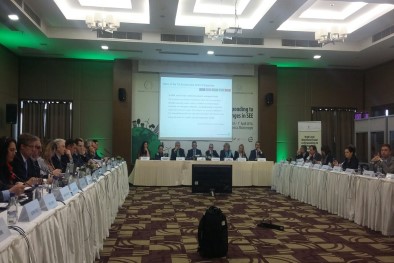The Ministers, along with international development partners and civil society representatives, discussed the state of climate and environment in SEE and reviewed ongoing regional cooperation in the field. The vulnerability of the region to climate change and the threats posed on water, energy and food sectors as well as to the security of critical infrastructure by an increase in extreme events such as the catastrophic floods in Bosnia and Herzegovina, Serbia and Croatia in 2014, were emphasized by the RCC Secretary General Mr. Goran Svilanovic.
The Meeting focused on the advantages and shortcomings of the current initiatives, including for addressing challenges towards water security. Despite numerous efforts, the region needs better interconnectivity in all fields, especially the environmental one, was noted by the Montenegrin Minister of Sustainable Development and Tourism Mr. Branimir Gvozdenovic.
The Ministers agreed on a joint declaration titled “The Podgorica Initiative” supporting a regional approach to environmental and climate change issues and commended the cooperation with the RCC and other regional partners, including the Global Water Partnership-Mediterranean (GWP-Med), which have supported the establishment and functioning of the Regional Working Group on Environment. The Chairing of that Working Group for the next two years was passed on from Montenegro to Serbia at the Meeting.
The Ministers also highlighted their focus in implementing the Paris COP 21 Climate Agreement and asked Montenegro as the Meeting’s host country to convey the ‘Podgorica Initiative’ to the Paris Western Balkans Summit in summer 2016.
In his intervention the GWP-Med Executive Secretary Mr. Vangelis Constantianos restated the long standing commitment of the organization to assist SEE countries towards water security, including by addressing climate change and environmental objectives. He focused on three examples of how GWP-Med contributes in the implementation of the SEE 2020 Strategy as a co-Coordinator of the ‘Environment’ Regional Dimension, together with the Regional Environmental Center (REC) and the Regional Rural Development Standing Working Group (SWG). More specifically, he noted GWP-Med’s assistance for:
- advancing Transboundary Cooperation in SEE, in basins such as this of Drin River and, possibly, towards establishing a regional framework on Transboundary Water Resources Management in SEE;
- introducing the Water-Food-Energy-Ecosystems Nexus approach, towards addressing interdependencies and fostering investmentsas well as tackling impacts of increased human migration flows;
- for adapting new tools and partnerships for Financing the Water Sector, including through socially-sensitive engagement of the private sector.
The Ministerial Meeting was organized by the RCC, Montenegro and REC in partnership with GWP-Med, Umweltbundesamt - the Environment Agency of Austria, SWG, IUCN, GIZ), and SEE Change Net.
